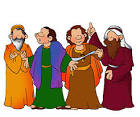John 7:1 – After this Jesus went about in Galilee. He would not go about in Judea, because the Jews were seeking to kill him.
As the scene opens here in chapter 7, we find a situation of overall hostility toward Jesus.
The support of the common people had quickly grown cold after the 'Bread of Heaven' sermon in Capernaum.
The religious leaders had turned on Jesus even earlier; they were already seeking to kill him:
John 5:16-18 - And therefore did the Jews persecute Jesus, and sought to slay him, because he had done these things on the Sabbath day. But Jesus answered them, My Father works still, and I work. Therefore the Jews sought the more to kill him, because he not only had broken the Sabbath, but said also that God was his Father, making himself equal with God.
Even his own family (see below) did not believe in him; his brothers challenged his ministry at this time and on several other occasions.
Knowing that the rage of the religious leaders had blossomed into a plan to end his life, Jesus simply stayed away from Judea/Jerusalem for a time, as not to aggravate his enemies. His decision had nothing to do with a fear of the Jews; since his time had not yet come, there was no purpose in confronting his adversaries at that precise moment.
Instead, he travelled around Galilee teaching and ministering to all who would listen. As he preached his way through the region, his travels brought him closer and closer to Judea and Jerusalem.
John 7:2 – Now the Jews' Feast of Booths was at hand.
We were told that the events in chapter 6 took place near the time of the Passover (John 6:4). Here in chapter 7, John relates events surrounding the Feast of Booths which occurs several months later. This results in a difference of opinion among scholars. Did Jesus attend the Passover in Jerusalem that year or not?
- Those who say 'no' maintain that Jesus stayed in Galilee during the Passover due to the open hostility of the Jews. This theory does carry some weight because we know that the Pharisees, Scribes and other religious leaders were in Jerusalem, actively looking for Jesus so they could kill him.
- Others believe that Jesus would never have missed presenting himself before the Lord at the temple, as all males were required to do (Deuteronomy 16:16). This theory also carries weight, because Jesus perfectly fulfilled the law.
Regardless of what happened at that particular Passover, John is now relating events that took place during the time of the Feast of Tabernacles (Leviticus 23:34-43) which was also known as the Feast of Booths or the Feast of Ingathering (Exodus 23:16).
What do we know about this feast?
It began on the 15th day of Tisri and it lasted seven days (Deuteronomy 16:13-15). Tisri corresponds to mid-September/mid-October on our calendar. This week was immediately followed by a day of solemn assembly. This last day (or eighth day) was actually a separate celebration or closing festival (Leviticus 23:34-36). It was considered the greatest day of the feast.
Two things are normally being celebrated during this feast – Israel's passage through the desert and thanksgiving for the harvest.
During the time of the desert wandering, the Jews lived a nomadic lifestyle – they moved from place to place to place, living in tents or other temporary dwellings. Even the tabernacle was designed as a movable building. Obviously, this phase of their existence lasted 40 years.
Eventually, God brought them into the Promised Land, where they inherited permanent dwellings. The Feast of Booths was a celebration that honored God for ending their wandering by giving them their own nation/inheritance.
 Since temporary dwellings (booths/huts/tabernacles) characterized the desert wandering, this was the symbol used during the Feast of Booths to remind Israel how God had kept his promises to them (Leviticus 23:34-43). The Jews would erect temporary booths or huts and live in them for the duration of the seven day celebration.
Since temporary dwellings (booths/huts/tabernacles) characterized the desert wandering, this was the symbol used during the Feast of Booths to remind Israel how God had kept his promises to them (Leviticus 23:34-43). The Jews would erect temporary booths or huts and live in them for the duration of the seven day celebration. In Jerusalem, these structures would pop up almost anywhere - on the roofs of houses, in the temple court and even on some of the street corners. These simple structures typically consisted of a frame filled in with boughs of olive, palm, pine, myrtle and other trees (Leviticus 23:40).
Spiritually speaking, this world is a place of desert sojourning for every Christian; eventually God will bring us into our permanent eternal home. While it may sometimes seem to last forever, the truth is that our lives here on earth are actually very short. James describes the length of our earthly life as a vapor or mist, which vanishes as soon as it comes:
James 4:14 – Whereas you know not what shall be tomorrow. For what is your life? It is even a vapor that appears for a little time, and then vanishes away.
The Feast of Booths is an excellent reminder to us that our time/sojourn here is short. If we want to be active in the kingdom of heaven, we must do so NOW. None of us is guaranteed tomorrow!
 The second component of this feast was a celebration of the harvest. During the time of the desert wandering, God provided manna for the Israelites to eat. Without his provision, they would have starved to death. Eventually, when God brought them into their inheritance, they were able to plant crops and reap normal harvests.
The second component of this feast was a celebration of the harvest. During the time of the desert wandering, God provided manna for the Israelites to eat. Without his provision, they would have starved to death. Eventually, when God brought them into their inheritance, they were able to plant crops and reap normal harvests.
So this festival is also one of thanksgiving to God for providing the food/harvest for the year.
During the seven feast days, specific offerings were sacrificed to the Lord in the temple. Each day two rams and 14 one-year-old lambs were sacrificed. Numerous bulls were also sacrificed – 13 on the first day, 12 on the second day, 11 on the third, etc. This means that on the final day seven bulls were sacrificed with the weekly total being 70. There were also specific grain and drink offerings given on these days as well (see Numbers 29:12-38 for full details).
The sacrifices for the next day, or day of solemn assembly (also called the eighth day, even though it was a separate feast) included one bull, one ram, and seven lambs plus grain and drink offerings.
During the festival the entire Law was read in the hearing of all the Jews – men, women, children and even 'strangers' or non-Jewish people who were part of the nation (Deuteronomy 31:10-13).
Why do you suppose the entire law was read to the people during this time? Back in the day, people did not have their own copies of the word of God as we do today. They couldn't just read it or study it whenever they desired, so these public days of reading were a very important review of God's laws.
The Bible speaks about God's people falling away from him during times of peace and prosperity:
Deuteronomy 31:20 - For when I [the Lord] shall have brought them into the land which I swore unto their fathers, that flows with milk and honey; and they shall have eaten and filled themselves, and grown fat; then will they turn unto other gods, and serve them, and provoke me, and break my covenant.
It was therefore appropriate for the people to be reminded of God's provision as they celebrated possession of the Promised Land and the harvests that kept them alive.
All things considered, the Feast of Booths was a very joyous and exciting celebration of the goodness of God.
John 7:3 – So his brothers said to him, "Leave here and go to Judea, that your disciples also may see the works you are doing."
In our culture, the word 'brother' is a specific term used to mean a sibling. But in the Hebrew culture, the word has a much broader definition. It can mean any close relative, such as a cousin (first, second, third) or an uncle.
Mary had at least one sister (John 19:25), and historical writings say that Joseph had several children by a former wife. Potentially, there were lots of 'brothers' or close relatives in the earthly family of Jesus.
 So while the use of the word 'brother' in this verse might refer exclusively to the actual half-brothers of Jesus, it could also include a much bigger group of people.
So while the use of the word 'brother' in this verse might refer exclusively to the actual half-brothers of Jesus, it could also include a much bigger group of people.At any rate, these relatives felt like they had the right to give advice to Jesus about how to conduct his ministry. Can you believe that?
In some ways, I can, because people still do the same thing today. What is your ministry? Have you ever had a brother or sister in Christ come and tell you how to run it, or what you should/should not do? Or perhaps they are being critical of your ministry, pointing out areas where they think you could do better, while at the same time, they aren't helping you in any way. I have experienced this first hand; it can be a very discouraging experience.
If you have a ministry, it probably falls under the umbrella of some authority like a pastor, board of trustees, church council or something of that nature. That's a good idea; this authority can help you avoid trouble/pitfalls, help you manage finances, and give you wise advice. But the true head of any Christian ministry is Jesus. He will advise you on how to run your ministry through Holy Spirit.
So if you receive the same kind of help or advice that Jesus is about to receive, don't let it discourage or irritate you. Continue to be in close communion with Jesus and he will make your path clear.
In this particular case, the brothers of Jesus advise him to leave Galilee and head for the more populated/public places. Their earthly/fleshly minds reasoned that if a person wants to be a celebrity, they need to perform in front of as many people as possible, or at least in front of the most influential people in society. They think that Jesus needs the support of others to have a successful ministry, or that Jesus will build his ministry on the foundation of other religious leaders.
Based on this thinking, they conclude that if Jesus really is (or wants to be) the Messiah, he should go to Jerusalem where the church leaders resided and allow the people there to witness his miracles.
John 7:4-5 – "For no one works in secret if he seeks to be known openly. If you do these things, show yourself to the world." For not even his brothers believed in him.
It is also possible that the relatives of Jesus are mocking his claim to be the Messiah.
They more or less challenge him to prove his claim by going to the upcoming Feast of Booths/Tabernacles and performing miracles in front of the crowds that would 'prove' he was the Messiah, or at least make him a wildly popular new leader in the Jewish community.
Again, their underlying thought process seems to be that any miracle or move of God that happened in a remote region was a waste of time and resources, because people of low esteem in society could not help Jesus reach his goal of being accepted as the Messiah. The testimony of common people was worth nothing; in their opinion Jesus needed the backing of the religious leaders/influential people of Jerusalem. They did not think Jesus was doing enough to secure that backing/support.
Although their reasoning seems ludicrous to us, it falls in line with the normal Jewish view that the Messiah was going to be a world ruler who would defeat their enemies (Rome) and immediately set up a physical kingdom on earth.
There may also have been an element of resentment or envy in their lives. Growing up with Jesus as a brother or relative was probably somewhat difficult as he never sinned or did the wrong thing, as we often do. Yet, at the same time, his perfection should have been a testimony to them that he was the Messiah.
One further point: In our last post, we discussed how Judas Iscariot was a true witness to the genuine character of Jesus. The same was true of the family of Jesus. If they had been fervent supporters of Jesus from the beginning, the religious leaders may have accused them of a conspiracy to make Jesus into something he was not.
But since the family did not believe in him as Messiah, they (like Judas) would have gladly pointed out any part of his life that did not line up with his claims to be the Son of God. Consequently, their early unbelief is further evidence of his genuine character and divine nature. The good news is that scripture indicates they eventually DID become Christians.
John 7:6-7 – Jesus said to them, "My time has not yet come, but your time is always here. The world cannot hate you, but it hates me because I testify about it that its works are evil."
The word 'time' may refer to either his manifestation as the Messiah, or the time of his death. In either case, Jesus responds to this advice by telling his brothers that they have no idea what they are talking about!
They could freely go up to the Feast of Booths or the capital of Jerusalem at any time without danger, because the world is friendly and favorable to them. By 'world', Jesus means men and women who retain their carnal nature because they are children of the devil (John 15:19). They have not yet received the gospel message and allowed the Spirit to regenerate or re-birth them into the Kingdom of Heaven. In our current vernacular we would say they are not yet 'born again'.
 Because they were still part of the world, Jesus' relatives would largely be unnoticed at the feast. On the surface, they were common Jews who did not oppose the members of the Sanhedrin or other religious leaders. Spiritually speaking, they were not going to do anything that would expose the sin of the current religious system; they were of no danger or consequence to the kingdom of satan.
Because they were still part of the world, Jesus' relatives would largely be unnoticed at the feast. On the surface, they were common Jews who did not oppose the members of the Sanhedrin or other religious leaders. Spiritually speaking, they were not going to do anything that would expose the sin of the current religious system; they were of no danger or consequence to the kingdom of satan.
Jesus, however, was a mortal enemy of the world because he exposed and reproved it of sin. When the gospel message is clearly proclaimed, men and women recognize their guilt/sin. Therefore, satan will do anything in his power to oppose the gospel message, because it results in the salvation of people and the destruction of his kingdom.
For the most part, the religious community of that day was under the influence of satan. They clearly saw Jesus as an enemy; they already made the decision to silence (kill) him as soon as possible. Therefore, Jesus had to carefully follow the leading of Holy Spirit in regards to his appearance at the feast.
This brings up two points for our consideration:
One, Jesus didn't seek persecution, but he didn't run from it either. This is a principle he displayed throughout his ministry. It is one we have already made note of in our study of John's gospel. It is a principle we should live by as well. Just like Jesus, we need to seek Holy Spirit for up-to-date information on when to confront the kingdom of darkness, and when to avoid it.
Secondly, we can't help but notice that satan was comfortable operating in the religious system of that day. What religious system are you operating under?
James 4:4 - You adulterers and adulteresses, know you not that the friendship of the world is enmity with God. Whosoever therefore will be a friend of the world is the enemy of God.
Does your church stand by the doctrines of the Bible, even though they are in direct conflict to what the world believes? Or is satan at home in your church because it mirrors his kingdom?
What about you personally - is there a difference between your conduct/speech/goals and that of the world? How big of a difference? Are you on fire for God or has your association with the world made you lukewarm? Remember, God would rather that you are either cold or hot; if we are lukewarm like the Laodiceans, Jesus will spit us out of his mouth (Revelation 3:16)!
John 7:8-9 – "You go up to the feast. I am not going up to this feast, for my time has not yet fully come." After saying this, he remained in Galilee.
Jesus tells his brothers not to wait for him. They should go up to the feast whenever they were ready; he would come at the time that was right for him.
Jesus remained where he was until about the middle of the feast (verse 14). Specifically, he waited until about four days after his brothers (and the vast majority of the Jews in general) had gone to Jerusalem. By arriving separately from his family, there was a much better chance of him arriving anonymously or inconspicuously. It is unclear whether or not he traveled to the feast with the twelve.
John 7:10 – But after his brothers had gone up to the feast, then he also went up, not publicly but in private.
Based on what we found earlier in the gospel of John, it is very likely that all of the Jews (including the relatives of Jesus) would have traveled to Jerusalem via the roads on the eastern side of the Jordan. Jesus, however, probably chose to go through Samaria.
 This would have given him the chance to further minister in that community, while also allowing him to avoid the crowds of people using the eastern route to the capital. In this instance, avoiding the crowds was very prudent. If he walked with them, he would have attracted a lot of attention; people would certainly have asked him for miracles. Had he performed miracles of healing/deliverance/provision, it would have been published immediately upon his entrance to Jerusalem which in turn would have caused swift confrontation with his enemies.
This would have given him the chance to further minister in that community, while also allowing him to avoid the crowds of people using the eastern route to the capital. In this instance, avoiding the crowds was very prudent. If he walked with them, he would have attracted a lot of attention; people would certainly have asked him for miracles. Had he performed miracles of healing/deliverance/provision, it would have been published immediately upon his entrance to Jerusalem which in turn would have caused swift confrontation with his enemies.So the combination of coming at a later time, coming alone and taking a different route resulted in his 'private' journey to Jerusalem.
John 7:11 – The Jews were looking for him at the feast, and saying, "Where is he?"
In this verse 'the Jews' refers to the Scribes, Pharisees and other official representatives of the nation (not the inhabitants of Jerusalem in general). Apparently, they were all anxiously looking for the arrival of Jesus.
The fact that they were looking for him tells us several things:
- They naturally expected him to be there. As a devout Jew and adherent to the law, Jesus attended all of the mandated feasts. Therefore, the rulers could be absolutely certain that Jesus would attend the Feast of Booths.
- Their hostility towards him had reached a level that produced some kind of a definite plot against him. There can be no question about this. They intended to kill him about six months earlier, at the Passover (John 5:18) for allegedly violating the Sabbath and for making himself equal with God. When that didn't work, they came up with a new plan, which they were anxious to execute.
- They were actively trying to prevent the common Jews from turning to Jesus. The next verses plainly show that the Jews wanted to hear more from Jesus, but they lived in fear of the religious rulers, who warned them against following Christ. In fact, the rulers threatened the people with expulsion from the synagogue if they supported Jesus (John 9:22, John 12:42).
John 7:12 – And there was much muttering about him among the people. While some said, "He is a good man", others said, "No, he is leading the people astray."
Anytime people congregate in crowds or gatherings they tend to discuss current events and/or the noteworthy people of their day. No doubt you and I can verify this by our own behavior.
The Jews back in Jerusalem did the same thing. As they saw friends, relatives and even acquaintances at the feast, Jesus was a common topic of conversation; his character was a source of great debate.
- Was he a good man? A new prophet sent to them directly from God? Those who had seen or experienced his miracles and heard his teaching certainly thought so. How could anyone do such miracles unless God was with him? Besides, Jesus taught with authority, not like the Scribes and Pharisees.
- Was he a charlatan; a false Messiah who was deceiving them for his own gain? Those who were offended at his teaching certainly thought so. Besides, if the religious rulers of the nation labeled him a heretic and a fake, who were the Jews to argue?
The multitude was certainly divided in their opinions concerning him.
John 7:13 – Yet for fear of the Jews no one spoke openly of him.
In this instance, 'openly' means 'boldly'. This comment refers to Jesus' supporters, not his critics. Those who sided with the religious leaders had no reason to fear sharing their opinions.
However, those who believed he was the Messiah dared not boldly declare it for fear of reprisals from the leaders of the nation. They quietly said good things about him but did not boldly support him in public.
 Interestingly, our culture is moving in the same direction. Those who believe in definite truth or right and wrong as outlined in the Bible are marginalized or accused of being hateful to certain segments of society. Many media outlets and social media sites want to block any free speech about Jesus or absolute truth or what the Bible classifies as right/wrong. Even government is trying to curb our freedom to practice Christianity and stand up for righteousness.
Interestingly, our culture is moving in the same direction. Those who believe in definite truth or right and wrong as outlined in the Bible are marginalized or accused of being hateful to certain segments of society. Many media outlets and social media sites want to block any free speech about Jesus or absolute truth or what the Bible classifies as right/wrong. Even government is trying to curb our freedom to practice Christianity and stand up for righteousness.
Personally, I expect this trend to continue. But I also expect God to release a powerful move of Holy Spirit on the earth. With his anointing, we can boldly confront those who oppose us, as the disciples did after the day of Pentecost. With his anointing, we can expect miracles to once again be commonplace in the church. And we can expect a world-wide harvest of souls - perhaps even the greatest enemies of the cross will become our brothers and sisters. AMEN!
Let me offer you some encouragement, relief and strength:
Family - sometimes there is nothing better and sometimes there is nothing worse!
 The family of Jesus did not understand or accept his role as the Messiah (at first). They had a mixture of unbelief, envy and true concern which caused them to ridicule and question his every move. Some of us have family who do the same!
The family of Jesus did not understand or accept his role as the Messiah (at first). They had a mixture of unbelief, envy and true concern which caused them to ridicule and question his every move. Some of us have family who do the same!
But Jesus did not allow them to side track his mission; he continued to follow the leading of Holy Spirit. He maintained his relationships with his family, despite their efforts to make his life harder. There is no evidence to suggest that he argued or became angry with them, even though they did not believe in him as Messiah. (Let's face it - he could have called down fire from heaven to consume them, but he didn't. I wonder if we would make the same choice!)
Scripture indicates that eventually, after Jesus' death and resurrection, his brothers become Christians and entered into the kingdom of heaven.
Perhaps you have a similar situation - a loved one who mocks and/or questions your faith. They may even throw every mistake you make in your face. I have a relative like this, and sometimes it can be very exasperating!
My advice (or what I try to do anyway), is follow the lead of Jesus. I continue to lift this relative up before the throne of God, asking for their salvation. I continue to maintain contact with them, even when they spew hateful rhetoric about the gospel. I try to reason with them and engage in debate with them, while still loving them. I know you are doing the same for your unsaved loved ones.
Let us steadfastly continue to minister to them, no matter what. I have faith that someday they will surrender to Christ, just as the brothers of Jesus did. In the meantime, we will not give up on them!
